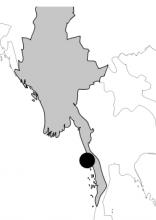Land Grabbing in Dawei (Myanmar/Burma): An (Inter)National Human Rights Concern
By Paung Ku and Transnational Institute • October 9, 2012 Land grabbing is an urgent concern for people in Tanintharyi Division, and ultimately one of national and international concern, as tens of thousands of people are being displaced for the Dawei Special Economic Zone (SEZ). Dawei lies within Myanmar’s (Burma) southernmost region, the Tanintharyi Division, which borders Mon State to the North, and Thailand to the East, on territory that connects the Malay Peninsula with mainland Asia. This highly populated and prosperous region is significant because of its ecologically-diversity and strategic position along the Andaman coast.
Land grabbing is an urgent concern for people in Tanintharyi Division, and ultimately one of national and international concern, as tens of thousands of people are being displaced for the Dawei Special Economic Zone (SEZ). Dawei lies within Myanmar’s (Burma) southernmost region, the Tanintharyi Division, which borders Mon State to the North, and Thailand to the East, on territory that connects the Malay Peninsula with mainland Asia. This highly populated and prosperous region is significant because of its ecologically-diversity and strategic position along the Andaman coast.
Since 2008 the area has been at risk of massive expulsion of people and unprecedented environmental costs, when a Memorandum of Understanding (MoU) between the Thai and Myanmar governments, followed by a MoU between Thai investor Italian-Thai Development Corporation (ITD) and Myanma Port Authority, granted ITD access to the Dawei region to build Asia’s newest regional hub. Thai interest in Dawei is strategic for two reasons. First, the small city happens to be Bangkok’s nearest gateway to the Andaman Sea, and ultimately to India and the Middle East. Second, the project links with a broader regional development plan, strategically plugging into the Asian Development Bank’s (ADB) East-West Economic Corridor, a massive transport and trade network connecting Myanmar, Thailand, Laos, and Vietnam; the Southern Economic Corridor (connecting to Cambodia); and the North-South Economic Corridor, with rail links to Kunming, China. If all goes as planned, the Dawei SEZ project, with an estimated infrastructural investment of over USD $50 billion will be Southeast Asia’s largest industrial complex, complete with a deep seaport, industrial estate (including large petrochemical industrial complex, heavy industry zone, oil and gas industry, as well as medium and light industries), and a road/pipeline/rail link that will extend 350 kilometers to Bangkok (via Kanchanaburi). The project even has its own legal framework, the Dawei Special Economic Zone Law, drafted in 2011 to ensure the industrial estate is attractive to potential investors.
Tags: Dawei Special Economic Zone, Investment, Italian-Thai Development, Land Confiscation, Paung Ku, Thailand, Transnational InstituteThis post is in: Human Rights, Spotlight
Related PostsLocal Groups Demand Accountability Upon Japan’s Announcement of Official Involvement in the Dawei SEZ
Women Activists Facing Harassment by Proponents of Dawei Special Economic Zone
Our Lives Not For Sale: Tavoyan Women Speak Out Against the Dawei Special Economic Zone Project
New National Land Use Policy Must Reflect the Concerns of those Affected
Voices from the Ground: Concerns over the Dawei Special Economic Zone and Related Projects









 All posts
All posts